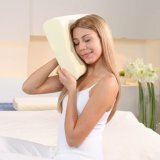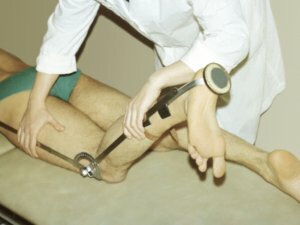How to choose an orthopedic pillow

Today you can buy an orthopedic pillow anywhere - from questionable stalls to specialized stores. However, there is no guarantee that in the latter case you will acquire a quality product. Therefore, you need to know how to choose an orthopedic pillow.
Orthopedic pillow should be selected for such basic parameters as the degree of rigidity and height. Factors that certainly influence the choice of a pillow include shoulder width and height of the user, his favorite posture during sleep, the pillow filler material, and the type of mattress.
Dimensions of orthopedic pillows
The width and length of orthopedic pillows are standard values, so the only thing to consider is the proportionality of the width of the orthopedic pillow and mattress - it is important that the pillow is narrower than the mattress. The length of orthopedic pillows can vary from 40 to 80 cm, and the width can be from 30 to 50 cm.
The principal parameter in choosing an orthopedic pillow, as mentioned above, is its height. It is from 6 to 16 cm. For most people, models of medium height, from 10 to 14 cm, are suitable. High orthopedic pillows, from 13 to 16 cm, will fit broad-shouldered people, and also fans will sleep on their sides. A high orthopedic pillow also helps to compensate for the stiffness of the mattress, so this model will be necessary for people who sleep on a hard surface. Low cushions, from 6 to 11 cm, are recommended for lovers to sleep on the stomach or back, on a soft or medium soft mattress, as well as people with medium or small swing of the shoulder. In order to choose the right pillow, it is worth remembering that the predetermining factor in choosing the height of the model is, first of all, the width of the shoulder.
Degree of rigidity of orthopedic pillows
When choosing the degree of cushion stiffness, it is mainly necessary to take into account the favorite posture during sleep. People who prefer to sleep on their sides will have a hard pillow - it will provide the most support to the neck, and thus help get rid of the numbing of the muscles in the neck and shoulder numbness. Fans of sleeping on their stomachs are advised to choose an orthopedic pillow soft - it will lower the tension of the muscles of the neck, thus relieve the pain in this area. And finally, people who are accustomed to sleeping face up, it is better to choose a model of moderate stiffness - it will smooth out such lacks of sleep in this position, like back pain and snoring.
The shape of the orthopedic pillows
The optimal shape of the pillow also depends on what position the person is used to sleeping in. People who prefer to sleep on their stomachs, it is better to choose a model of the usual form, oblong, but without rollers. For those who like to sleep on their side or back, a pillow with rollers will do. It should be noted that an anatomically correct pillow( that is, with two rollers) usually requires addiction. Such an orthopedic pillow may seem not very comfortable for people who have been sleeping for a long time on a too soft or high pillow. Addiction, as a rule, lasts no longer than a week.
Fillers of orthopedic pillows
Fillers can be synthetic and natural. In both cases, the material is environmentally friendly, so the choice of pillow depends largely on a person's personal preferences. Natural pillow fillers provide optimal heat and moisture exchange, demonstrate a greater degree of elasticity and elasticity. Synthetic fillers orthopedic pillows are hypoallergenic and tend to them, as a rule, easier. Whichever pillow filler you choose, before purchasing, try to lie on it or at least hold it in your hands - so you will appreciate the degree of rigidity and comfort level of the model.
So, here are the main criteria for a good orthopedic pillow. It should:
- - have hypoallergenic properties,
- - keep body heat,
- - guarantee comfortable head and neck position,
- - it is easy to wear off not only by hands, but also in a washing machine;Not to lose its shape and properties after repeated washing,
- - to be sufficiently wear-resistant,
- - not to absorb extraneous smells,
- - to be fireproof.



